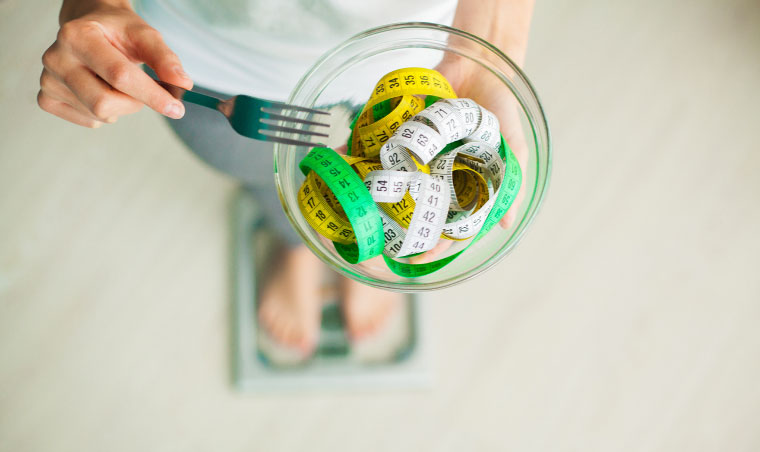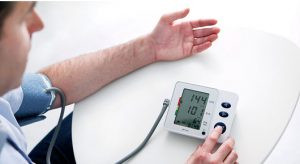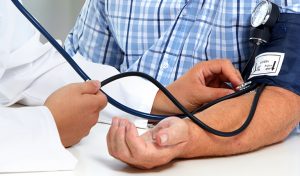Hypertension or high blood pressure is a chronic medical condition in which the force with which blood flows in your arteries is consistently higher than the defined normal range. It makes the heart work harder to pump out the blood against this higher pressure, affecting the blood vessels and vital organs in the long run.
Blood pressure is a force exerted by blood flow against the artery walls. In adults, normal blood pressure measurement is 120/80 mm Hg. During blood pressure it rises to 130/80 mmHg or higher. It can be detected by checking blood pressure using a BP measuring instrument. One must never self-diagnose in this case.
Management of high blood pressure involves diet and lifestyle modifications along with the prescribed treatment. Here are a few natural ways to manage blood pressure that you can try after a quick check with your doctor.
Let’s take a look at some things you can do to manage your blood pressure along with the prescribed medicines:

Choose any physical activity that suits you. You may try walking, jogging, yoga, swimming or Zumba.

Sleeping and waking up simultaneously every day are beneficial for your health. Sound sleep for 7-8 hours is considered healthy.

Yoga, meditation and mindfulness are some techniques that can help you keep stress and related complications at bay.

People with obesity are at higher risk for high blood pressure and heart diseases. It is essential to maintain your body weight and waist circumference in a healthy range.
Include more fresh seasonal fruits and vegetables in your diet.
Maintain a good balance of good quality carbohydrates, fibre, proteins and healthy fats on your plate.
Cut off on extra salt and deep-fried, packaged and processed food.
Listed below are a few healthy food items that you may include in your diet
Celery is rich in potassium, dietary fibre, vitamin K, folate, manganese, etc. Potassium is necessary for the heart and might help manage high blood pressure. Blend some fresh celery stalks in a juicer and enjoy the fresh drink. You can also mix the juice with some honey.
Oatmeal is a rich source of dietary fibre and oatmeal porridge may be one of the beneficial natural remedies for high blood pressure. To make oatmeal porridge, add some hot water, milk, fruit and oats. Stir the mixture and serve it hot.
Drinking green tea can be helpful. Add some green tea leaves or a green tea bag to hot water and let it simmer for a few minutes. Strain it, and your tea is ready. Add little honey or lemon juice to it.
Considered one of the best home remedies for blood pressure, garlic pearl preparations may be beneficial. Other garlic supplements (Kyolic-aged garlic extract) may also be helpful.
Lemon ginger tea may be a beneficial home remedy for blood pressure. Brew some by boiling lemon and ginger together in the water. You can also add a little honey if you like. You can also add it to your regular black tea.
Hypertension is often asymptomatic. Look for the following danger signs:
High blood pressure is a severe health condition and needs diagnosis and treatment appropriately. Always consult your doctor.
Hypertension or high blood pressure likely develops with age or a sedentary lifestyle. Dietary and lifestyle changes and proper medications might help you lower the risk of associated health complications. A regular checkup and doctor’s consultation can help you manage blood pressure well.
Disclaimer: The information included on this site is for educational purposes only and is not intended to be a substitute for medical treatment by a healthcare professional. Because of unique individual needs, the reader should consult their physician to determine the appropriateness of the information for the reader’s situation.
Hypertension or high blood pressure in so common that today nearly every family has an adult with the condition. It might be dangerous if left unchecked. Hypertension is a chronic medical condition in which the blood pressure in the arteries is elevated. It makes the heart work harder to pump out the blood against this higher pressure, affecting the arteries (blood vessels) in the long run. Normal blood pressure is a force when a heart pumps blood against the artery walls. In adults, normal blood pressure measurement is 120/80 mmHg. The blood pressure during hypertension is 130/80 mmHg or higher. The higher the pressure, the greater the risk of complications. 1,2
Hypertension increases the risk of heart diseases and stroke. Other conditions such as kidney diseases, congestive heart failure and blindness may also occur in case of very high blood pressure for too long.
It is estimated that twenty-nine per cent of adults in the US are affected by hypertension. The occurrence of this condition increases along with age and approximately 63 per cent of people over the 60s are more affected. Hypertension is more common in African Americans. It might start at a younger age and is more severe than in other populations.1,2
About 75-80 per cent of the world population, especially in developing countries, has started using herbal medications to manage hypertension. Herbal medicines have greater acceptability with the human body and have fewer side effects.1
So readers, presented below are a few home remedies for hypertension that you can try for managing hypertension in the comfort of your home, after a quick check with your doctor. Do not try to replace your current medicines with these herbal remedies.
The underlying cause of hypertension is unknown in ninety-five per cent of the cases. It might be related to both genetic as well as environmental factors.1,2
The following factors might increase the risk of developing hypertension.
Also Read: Natural Home Remedies For Diabetes By Dr. Rajeev Singh
These days incidence of hypertension in the young population has increased significantly. In many cases, patients are unaware that they are having high blood pressure(because there are no symptoms). After the age of 30, one should get their blood pressure checked periodically so that their hypertension is diagnosed at the earliest, which will help them to prevent any further complications.
Dr. Nikhil Yadav – MBBS MD, CCEBDM
One of the significant concerns about hypertension is that you may not even know that you have it. This can be because there is no direct cause identified yet. The following signs and symptoms must be noted in cases of extremely high blood pressure and may be completely missing in people with high blood pressure.1,2
Also Read: Natural Home Remedies To Reduce Belly Fat
Some home remedies for managing hypertension that you can try along with your prescribed medicines are:
In hypertension, changing or altering your regular lifestyle can go a really long way in managing the increased blood pressure. Regular exercise might increase heart performance. A proper diet regime containing more fruits and vegetables is a good choice. Avoiding having foods that are high in cholesterol, salts and fats can help maintain your blood pressure within healthier range and reduce the need for medicines.3
Celery is a medicinal herb that is used as a food and traditional medicine. Celery contains essential oils and flavonoids. It is rich in potassium, dietary fibre, vitamin K, folate, manganese, etc. Potassium is necessary for the heart and might help manage high blood pressure.4
Oatmeal is a rich source of dietary fibre, and one of the many possibly beneficial home remedies to lower blood pressure. A diet containing soluble whole oats might significantly lower hypertension. A scientific study (Keenan et al. 2002) found that adding oats cereal to a patient’s regular hypertension diet substantially reduces systolic and diastolic blood pressure. Whole oats may be an effective dietary therapy in the treatment of hypertension.1
Oatmeal porridge may be one of the beneficial natural remedies for high blood pressure. To make oatmeal porridge, add some hot water and sugar to the oats cereal mixture. You can adjust the porridge consistency as you want by stirring the mixture. Oatmeal porridge is instant food and yet, it is so healthy that it may be used for managing hypertension.
Several health benefits associated with tea might potentially be useful for managing hypertension. Research by Yang et al. 2004 suggests that drinking green tea (unfermented) and oolong tea (partially fermented) might decrease the risk of developing hypertension.1
Oolong tea is partially fermented and sits between black and green tea. It is a more caffeinated-type tea.
Drinking green tea may provide instant relief from high bp. To make green tea, add some green tea leaves or a green tea bag in hot water. Let it simmer for a few minutes. Then, remove the leaves and use the brew to sip on. You can also add honey or some lemon juice to it if you don’t like the taste of green tea. Nothing beats this home remedy if you stay in a cold region.
It is a very common observation that a person might be taking medicines to control hypertension which are not effective or the patient has stopped taking medicines for hypertension which leads to uncontrolled hypertension, which might lead to a life-threatening situation. These should be attended by a physician on an urgent basis.
Dr Ashish Bajaj – M.B.B.S, M.D. in Clinical Pharmacology and Toxicology
Garlic might be considered one of the best home remedies for hypertension given how widely it is available in nearly every household in abundance! Studies have reported that it may have hypotensive action (blood pressure-lowering effect). Garlic is thought to increase nitric oxide production, which might result in smooth muscle relaxation and dilation of vessels. The active compound that gives garlic its unique odour and healing benefits is known as allicin.1
One study (Mojiminiyi et al. 2007) reported the calyx of hibiscus has a blood pressure-lowering effect. An animal study (Adegunloye et al. 1996) also suggested that an intravenous administration of the water extract of dry hibiscus calyx produced a drop in the blood pressure in animal studies. A human clinical trial of the plant extract has shown similar evidence.1
Also Read: Hibiscus: Uses, Benefits, Side Effects, And More!
Hawthorn or hawberry has been used in China for thousands of years. It maybe used as a decoction for managing hypertension. Various studies, including clinical trials and pharmacological studies, have shown that it has the ability to lower blood pressure. Hawthorn contains two main substances – procyanidins and flavonoids that might contribute to its beneficial effects on the heart. These essential components have potent antioxidant activity.1
Ginger roots are commonly used in Asian cooking. They might help to enhance blood circulation and relaxe the muscles surrounding blood vessels. There are various formulations used in animal studies, such as ginger rhizome and Korean ginseng extract. A report by (Nicoll et al. 2009) suggested that the human trials for the hypotensive (low blood pressure) effect of ginger have been few and generally resulted in inconclusive results.1
Though there are studies that show the benefits of the given herb and home remedies in the condition, these are insufficient. Therefore, there is a need for large-scale human studies to establish the true extent of the benefits of these home remedies on human health. Thus, these should only be taken with caution and never as a substitute for medical treatment.
Also Read: Natural Home Remedies For Constipation By Dr. Siddharth Gupta
Celery contains high levels of 3-N-butylphthalide, a kind of photochemical that may help in controlling high blood pressure. You can eat a few stalks of celery as a simple snack daily.
Dr. M.G. Kartheeka – MBBS, MD(Pediatrics)
Hypertension is often asymptomatic. However, you must take immediate medical attention if you see the following danger signs-
You must not rely on home remedies alone for the treatment of hypertension or high blood pressure. You should consult a qualified doctor for any advice for hypertension. Hypertension is a severe health condition and needs diagnosis and treatment appropriately.
Over the past 50 years, the definition of hypertension has continuously evolved. Hypertension or high blood pressure likely develops with advancing age. It is a complex disease and is influenced by genetic as well as environmental factors. 3
Though there are no symptoms of hypertension and some people don’t even know that they have it, a regular checkup and doctor’s consultation will help you establish it and treat it in time.
A lifestyle and dietary changes along with proper medications might help you lower the risk of associated health complications.1 You can follow simple home remedies that may be helpful in managing hypertension. But ultimately, the doctor’s advice is essential.
Hypertension is classified as primary (essential) or secondary hypertension. About 90 to 95% of cases are called primary hypertension. It refers to high blood pressure for which no medical cause has been identified. The remaining 5 to 10% of cases are termed secondary hypertension and are caused by some underlying medical condition and can often be corrected.1
Hypertension is estimated to affect about 63 per cent of adults above the age of sixty. Other than this, there is a possibility that it might start in the younger generation in case of African Americans.2
Herbal medicines are used in most developing countries due to their better tolerability and fewer side effects. Other herbs such as flaxseeds, basil, soybeans, tomato, sesame, cocoa bean, cocoa butter, carrot, radish, black plum, pomegranate, murungai, etc. may be used as potential home remedies for managing hypertension.1 However, people should not use these herbs to self-medicate themselves on their own before consulting with an Ayurvedic physician.
Other than herbal medicines, conventional medicines such as beta-blockers, diuretics, calcium channel blockers, and angiotensin-converting enzyme (ACE) inhibitors have been used. They all have been shown to reduce the occurrence of stroke in patients with hypertension.3 However, people must consult their doctor before using any medicines to manage hypertension.
1. Tabassum N, Ahmad F. Role of natural herbs in the treatment of hypertension. Pharmaco Rev. 2011;5(9):30-40. Available from: https://www.ncbi.nlm.nih.gov/pmc/articles/PMC3210006/pdf/PRev-5-30.pdf
2. Hypertension: MedlinePlus Genetics [Internet]. [cited 2022 Jul 7]. Available from: https://medlineplus.gov/genetics/condition/hypertension/#references
3. Price R, Kasner S. Hypertension and hypertensive encephalopathy. Handb Clin Neurol. 2014;119:161–167. Available from: https://pubmed.ncbi.nlm.nih.gov/24365295/
4. Illes J. Blood Pressure Change After Celery Juice Ingestion in a Hypertensive Elderly Male. Journal of Chiropractic Medicine. 2021;20(2):90–94. Available from: https://www.ncbi.nlm.nih.gov/pmc/articles/PMC8703128/pdf/main.pdf
5. Ried K. Garlic lowers blood pressure in hypertensive subjects, improves arterial stiffness and gut microbiota: A review and meta-analysis. Experime and Therape Med. 2020;19(2):1472-1478. Available from: https://www.ncbi.nlm.nih.gov/pmc/articles/PMC6966103/pdf/etm-19-02-1472.pdf
6. Singh P, Khan M, Hailemariam H. Nutritional and health importance of Hibiscus sabdariffa: a review and indication for research needs. J of Nutri Health & Food Engin. 2017;6(5):125–128. Available from: http://medcraveonline.com/JNHFE/JNHFE-06-00212.pdf
Disclaimer: The information provided here is for educational/awareness purposes only and is not intended to be a substitute for medical treatment by a healthcare professional and should not be relied upon to diagnose or treat any medical condition. The reader should consult a registered medical practitioner to determine the appropriateness of the information and before consuming any medication. PharmEasy does not provide any guarantee or warranty (express or implied) regarding the accuracy, adequacy, completeness, legality, reliability or usefulness of the information; and disclaims any liability arising thereof.
Links and product recommendations in the information provided here are advertisements of third-party products available on the website. PharmEasy does not make any representation on the accuracy or suitability of such products/services. Advertisements do not influence the editorial decisions or content. The information in this blog is subject to change without notice. The authors and administrators reserve the right to modify, add, or remove content without notification. It is your responsibility to review this disclaimer regularly for any changes.

High blood pressure can be fatal and hence it is important to know how to keep it under control. Hypertension is a blood pressure reading above 140/90 mmHg. Such a high reading puts one at risk for a number of serious health conditions, including stroke and heart disease. Knowing the essential Steps to Control high blood pressure would help at great levels.
Maintaining hypertension requires a lot of healthy lifestyle changes which should be a part of your personal life goals. Continue to follow the points mentioned below and try to incorporate it into your daily habits.
The higher the sodium in the body the higher the blood pressure. Adopting a low-sodium diet can help keep the blood pressure normal. Limit to consuming a total of 1,500 milligrams of salt per day which means no processed foods.
DASH stands for Dietary Approaches to Stop Hypertension. Following a DASH diet means including a lot of fresh fruits and vegetables, 4-5 servings of nuts, seeds, and legumes in the diet. Encourage a lot of protein in your diet and avoid fat, sugar. Also, include plenty of whole grains in the diet like brown bread, rice, pasta, etc
Also Read: Signs to Stop Water Fasting: Boundary Between Health and Harm
One of the best ways to control hypertension is by maintaining body weight and the most effective way to do that is by staying active. Exercise will help in improving blood circulation, lung capacity, and heart efficiency.
If your doctor asked you to take your bp medicines at a particular time, take it exactly on time. Never skip your dosage. You can use the PharmEasy app to help set dosage reminders.
Make sure to check your blood pressure regularly by getting a check-up done at the clinic or at home. Most of the people target to keep their blood pressure at 140/90mmHg but that doesn’t necessarily have to be the case for everyone. Consult with your doctor and find out the target bp you have to maintain and work towards it.
Apart from all these, try to keep your stress under control as well. There are a lot of Steps to Control High blood pressure and follow a calmer lifestyle. A morning ritual which starts with positive thoughts and chamomile tea can have a very calm impact throughout the day.
Also read: Treating Hypertension: 5 Effective Ways
Disclaimer: The information provided here is for educational/awareness purposes only and is not intended to be a substitute for medical treatment by a healthcare professional and should not be relied upon to diagnose or treat any medical condition. The reader should consult a registered medical practitioner to determine the appropriateness of the information and before consuming any medication. PharmEasy does not provide any guarantee or warranty (express or implied) regarding the accuracy, adequacy, completeness, legality, reliability or usefulness of the information; and disclaims any liability arising thereof.
Links and product recommendations in the information provided here are advertisements of third-party products available on the website. PharmEasy does not make any representation on the accuracy or suitability of such products/services. Advertisements do not influence the editorial decisions or content. The information in this blog is subject to change without notice. The authors and administrators reserve the right to modify, add, or remove content without notification. It is your responsibility to review this disclaimer regularly for any changes.
In India, at least 23.10% of men and 22.60% of women above 25 years of age are patients with high blood pressure.
High Blood Pressure is also known as the silent killer as it goes undetected until a considerable amount of damage has been done to the arteries. Roughly, about 15 lakh Indians suffer from this condition.
Dealing with high blood pressure can be a pain as it needs a change in the lifestyle, eating habits and a strict medical regime. It is important that one sticks to the routine check-ups and medical follow-ups religiously to avoid life-threatening aftereffects.
Blood pressure (BP), should normally be below 120/80 mmHg most of the time, anything more than that, needs medical attention. As a patient with hypertension and high blood pressure, please take note of the health precautions to be followed:
The DASH diet is low in salt and rich in fruits, vegetables, whole grains, low-fat dairy, and lean protein. DASH stands for Dietary Approaches to Stop Hypertension. The diet was first created to help lower high blood pressure. It is also a healthy way to lose weight.
Dr. M.G. Kartheeka, MBBS, MD
Measuring blood pressure twice a day can provide you with more optimal blood pressure reading reducing the chances of fluctuations in the blood pressure. Take it first in the morning before eating or taking any medications. Take it again in the evening.
Dr. Ashish Bajaj, M.B.B.S., M.D
Regular eye checkups are recommended to check if there is any ocular damage.
High BP can cause damage to the heart and the blood vessels and hence, it is recommended that an ECG (Electrocardiogram), echocardiogram or a Doppler Ultrasound is when the doctor finds it necessary.
Disclaimer: The information provided here is for educational/awareness purposes only and is not intended to be a substitute for medical treatment by a healthcare professional and should not be relied upon to diagnose or treat any medical condition. The reader should consult a registered medical practitioner to determine the appropriateness of the information and before consuming any medication. PharmEasy does not provide any guarantee or warranty (express or implied) regarding the accuracy, adequacy, completeness, legality, reliability or usefulness of the information; and disclaims any liability arising thereof.
Links and product recommendations in the information provided here are advertisements of third-party products available on the website. PharmEasy does not make any representation on the accuracy or suitability of such products/services. Advertisements do not influence the editorial decisions or content. The information in this blog is subject to change without notice. The authors and administrators reserve the right to modify, add, or remove content without notification. It is your responsibility to review this disclaimer regularly for any changes.
According to the guidelines given by the American Heart Association, if the blood pressure falls in one of the below categories then the condition is called Hypertension:
Thus, Hypertension is nothing but high blood pressure and is a serious condition because it makes the heart work harder to pump blood into the body and if not controlled, can result in an increased risk of heart attacks, strokes, and kidney failures.
Similarly, Hypotension is low blood pressure. In this condition, the blood pressure typically falls below a Systolic value of 90 and a Diastolic value of 60.
Within prescribed limits, a low blood pressure reading is generally good. However, sometimes this condition can result in dizziness and tiredness. But if there are no adverse symptoms as such then there is nothing to worry about.
While the exact causes of high blood pressure are still unknown, medical practitioners attribute this condition to certain factors namely:
The dropping of blood pressure is a normal scenario. However, certain conditions cause low blood pressure for an extended period such as:
Did you know?
While high blood pressure doesn’t show any severe symptom (which is why it is also called a ‘silent killer’) as such, it is sometimes observed that some people suffering from high blood pressure do show signs of sweating, sleeping problems, and anxiety. However, if the Hypertensive crisis condition is reached, the patient may suffer from nose bleeding and headaches.
Some noticeable symptoms that should raise alarm bells include:
Patients usually ask which number is more important, the answer clinically is that systolic blood pressure (the first number) is considered a major risk factor for cardiovascular disease for people over 50 years of age.
Dr Ashish Bajaj – M.B.B.S, M.D. in Clinical Pharmacology and Toxicology
While many doctors prescribe medication to deal with high blood pressure, generally, it is best to bring a change in lifestyle and improving dietary choices along with prescribed medications.
Some lifestyle adjustments include:
Doctors generally also recommend a ‘DASH – Dietary Approaches to Stop Hypertension diet for high blood pressure patients who adhere to the above lifestyle adjustments.
Also read: Home Remedies for High Blood Pressure
Hypotension is generally defined as a blood pressure reading below 90/60 mm Hg. However, it is essential to note that normal blood pressure can vary from individual to individual. And what is considered low for one person may not be low for another.
Dr. M.G. Kartheeka – MBBS, MD(Pediatrics)
Simple, good to implement practices that may prevent low blood pressure which includes :
Hypertensive crisis is a medical emergency and if you face any signs of possible organ damage like chest pain, shortness of breath, back pain, numbness/weakness, change in vision or difficulty speaking, do not wait to see if your pressure comes down on its own.
Dr Ashish Bajaj – M.B.B.S, M.D. in Clinical Pharmacology and Toxicology
High blood pressure can rightfully be described as a ‘silent killer’. This is because there are rarely any high blood pressure symptoms but it poses a major threat of heart-related ailments like stroke. Some of the ways in which you can lower your high blood pressure without medications are as follows:
Links and product recommendations in the information provided here are advertisements of third-party products available on the website. PharmEasy does not make any representation on the accuracy or suitability of such products/services. Advertisements do not influence the editorial decisions or content. The information in this blog is subject to change without notice. The authors and administrators reserve the right to modify, add, or remove content without notification. It is your responsibility to review this disclaimer regularly for any changes.
Ref
https://www.who.int/health-topics/hypertension#tab=tab_1
https://www.cdc.gov/bloodpressure/about.htm
https://www.heart.org/en/health-topics/high-blood-pressure/the-facts-about-high-blood-pressure/low-blood-pressure-when-blood-pressure-is-too-low
Hypertension and obesity are dangerous health conditions that can cause multiple other health complications. Especially during the coronavirus pandemic, it is even more important to keep both in check because they are comorbid conditions of COVID-19 and can make it fatal.
So, Dr Ketan L Pakhale (Bariatric Physician and specialist in Metabolism Syndrome) delivered a webinar on hypertension and obesity recently. He explained several concepts related to hypertension and obesity so that we all can understand these disorders better and take the right action at the right time.
Metabolic syndrome is a health condition in which three of the following disorders occur simultaneously in a person-
So what does it mean if a person has metabolic syndrome? These people are more likely to develop heart disorders such as heart attack or cardiac arrest. According to a survey, nearly 60% of people have this syndrome.
Dr Pakhale stresses the need of taking metabolic syndrome seriously because it is a cluster of major diseases.
Hypertension means a rise in blood pressure. According to older guidelines issued by the American Heart Association, if blood pressure exceeds 120/80 mm of Hg, then it can damage your heart. But today, the person’s physical condition, age, lifestyle choices, medical history and the presence of certain symptoms such as chest pain, headache or breathlessness will determine if the person has hypertension.
If you are diagnosed with hypertension, you will be prescribed medicines, and you will constantly need to monitor your blood pressure.

Our lives are stressful, and it is the primary cause of hypertension. During the COVID-19 lockdown, stress has reached an all-time high. Anxiety about the loss of income, stressful conditions at home, worrying about the health of your loved ones can increase your blood pressure.
People who chew tobacco or smoke for long periods are likely to develop hypertension. Alcohol intake is another definitive cause of hypertension.
Being overweight leads to hypertension. It is a vicious cycle. Obesity causes hypertension, which in turn is linked to diabetes and dyslipidemia. And you can also develop metabolic syndrome. You may also develop kidney complications, thyroid disorders, PCOD etc.

Spicy foods that people usually love are bad news for their blood pressure. Soft drinks are also toxic for your body because of the presence of excessive sugar and preservatives (chemicals).
High salt intake is also linked to hypertension because sodium causes water retention. It makes people crave fatty foods cooked in refined oils, which are not good for your health at all.
Food sweeteners used in desserts, ice creams, beverages also need to be avoided as much as possible. You can consume them in moderation. But if you consume too many sweeteners, it can make you obese and give you hypertension.
In women, menopause is another reason that might cause hypertension.

1 out of every 2 Indians is obese. It increases the likelihood of premature death. In India, obesity is still not acknowledged as a major disease.
Obesity is excess visceral fat. When fats accumulate in your body, the cells are packed closely together and this cuts off the oxygen supply.
This can lead to hypertension, PCOD and diabetes. Even children can become obese, and in the future, they too will develop the above-mentioned illnesses or even cancer. Obesity also makes people feel insecure about their looks and they may even suffer social stigma.
However, if you lose weight, it will immediately reduce the risk of contracting other dangerous illnesses. It has also been observed that with proper weight control measures, people were able to stop taking medicines for hypertension, diabetes and antidepressants.
When you consume more food than you need and your energy expenditure is low, it leads to obesity.
Obesity is preventable, reversible and treatable.
People with obesity can also opt for bariatric surgery. But afterwards, they need to be careful about their diet or they might become malnourished.
Maintaining your metabolic health is the key to a life free of health complications. Now, more than ever, we need to be utterly cautious about what we eat, our physical activities and our lifestyle choices. With proper measures, metabolic syndrome can be kept at bay.
Q. Can hypothyroidism be caused by grief over the loss of a loved one?
Ans. Hypertension can be caused by the stress and trauma triggered by the demise of a loved one. But it is temporary and with medication, proper diet and physical exercise and meditation, it can be taken care of.
Sometimes hypertension can result in hypothyroidism.
Also Read: Is Cottage Cheese Good for You? Unraveling the Potential Health Benefits According to Science
Disclaimer: The information provided here is for educational/awareness purposes only and is not intended to be a substitute for medical treatment by a healthcare professional and should not be relied upon to diagnose or treat any medical condition. The reader should consult a registered medical practitioner to determine the appropriateness of the information and before consuming any medication. PharmEasy does not provide any guarantee or warranty (express or implied) regarding the accuracy, adequacy, completeness, legality, reliability or usefulness of the information; and disclaims any liability arising thereof.
Links and product recommendations in the information provided here are advertisements of third-party products available on the website. PharmEasy does not make any representation on the accuracy or suitability of such products/services. Advertisements do not influence the editorial decisions or content. The information in this blog is subject to change without notice. The authors and administrators reserve the right to modify, add, or remove content without notification. It is your responsibility to review this disclaimer regularly for any changes.